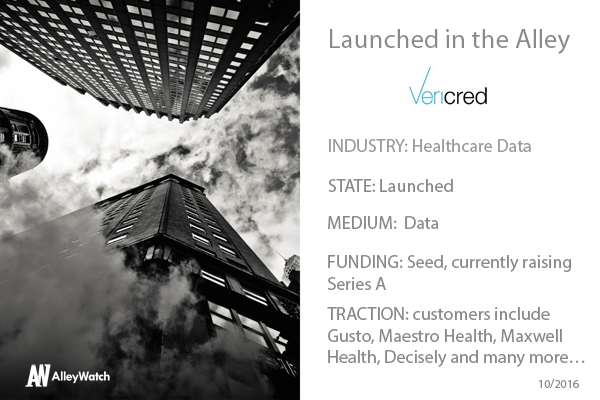
The healthcare debate is raging like never before. As the debate continues, there will inevitably be a number of changes – so much so that it’s often difficult to keep track of all the data at an aggregate level. Until Vericred – the data as a service startup that collects data from the top to fuel a number of different applications in the healthcare space. Initially focused on collecting data to make better purchasing decisions, the company is now focused on serving as a data provider for lead generation for insurance companies, physician referral tools, researchers, and a host of other uses that drive transparency around a traditionally opaque arena.
AlleyWatch chatted with Michael Levin about the startup and what difference Vericred can make.
Tell us about the product or service.
Health insurance is relevant to every touch point in the healthcare process from office visits to prescriptions. Vericred is a healthcare data services company. Our health insurance data platform includes health plan design and rate data, provider-network data and formulary data.
- Plan design and rate data speaks to all of the details around health plans: carrier, name, costs, benefits, and where they are available.
- Provider-network speaks to “who’s in and who’s out” of each network.
- Formulary data speaks to what drugs are covered by what plans and at what tier level.
- We serve our data through a single point of integration, a modern API. In the future we will be expanding our datasets to include dental, vision, life, LTD and other voluntary benefits.
- We are the ‘Sabre’ of health insurance and benefits.
How is it different?
Nothing like this exists in the health and benefits space. The raw data is highly fragmented, unstructured and changes rapidly. In the absence of our “single point of integration” customers would have to build, structure and clean this data on their own, which is onerous and expensive.
Our customers are technology companies that are transforming the way health insurance and employee benefits are being sold and utilized. We recently announced the addition of large group provider networks to our platform. This dataset expands our already extensive individual under 65 and small group provider networks. This, paired with our plan design and rate and formulary datasets enable innovative solutions.
We are the only healthcare data company offering complete data solutions so that these innovators, our customers, can focus their resources on building differentiated features, functionality, user experiences and distribution instead of building data.
What market are you attacking and how big is it?
Health insurance and employee benefits are a $1T market. From insurance lead, quoting and sales platforms, to drug apps, physician referral tools and pharmacy applications to researchers, our customers are transforming the way individuals interact with the healthcare system. Vericred is the data foundation on which these companies build innovative solutions – we enable innovation in the space.
What is the business model?
We are a Data as a Service company. We license data to business customers.
What inspired the business?
Health insurance is complex and confusing. While I was developing a business plan for a credentialing business, I had to secure health insurance for my family. I went on Healthcare.gov seeking a plan in which our five doctors participated. There was no tool allowing this kind of search, so I spent six hours going out to each carrier’s website to look for our doctors on each plan. I learned that provider-network data, a subset of the credentialing data we sought to build, did not exist in one place to power “provider-centric” plan search. And that is where we started.
In 2014 I paired up with my cofounder, Dan Langevin, and we formed Vericred to bring transparency and efficiency to the health insurance shopping process. Today, our team is working hard to connect the healthcare data ecosystem.
How are you able to modernize and integrate these datasets from various providers who may not be so progressive in their technology systems?
We’ve built a flexible data pipeline architecture that utilizes “adapters” for each new data source. This allows us to aggregate data from thousands of sources, and then normalize, structure and deliver useful data through a modern API, make useful data from any source, modern or otherwise.
What are the milestones that you plan to achieve within six months?
We plan to expand our datasets to the Medicare market and launch alerts and notifications to changes in datasets (i.e. a notification when your doctor drops out of a network).
What is the one piece of startup advice that you never got?
Building team and culture is the most challenging aspect.
If you could be put in touch with anyone in the New York Community who would it be and why?
I would love the chance to sit down and chat with Fred Wilson, American businessman and venture capitalist. I’m a fan of his blog and would love to ask him a question or two.
Why did you launch in New York?
We had a plan to launch in New Jersey, but incubated at Pivotal Labs. From there it was clear that in order to attract the right talent, we needed to be in New York. New Jersey is viewed as a different country by many in New York!
Where is your favorite bar in the city for an after work drink?
The fRYE bar, also known as the Vericred conference room. Every Friday at 4pm we pour Rye for the team. It’s a great way to finish the week and reflect on our progress and pain points.



